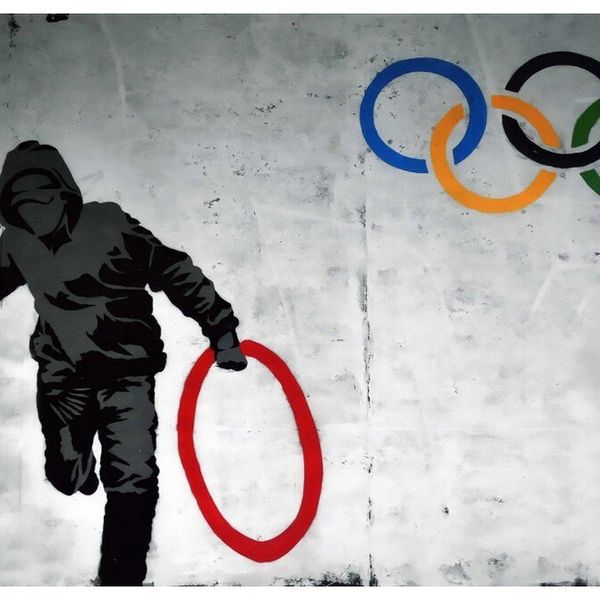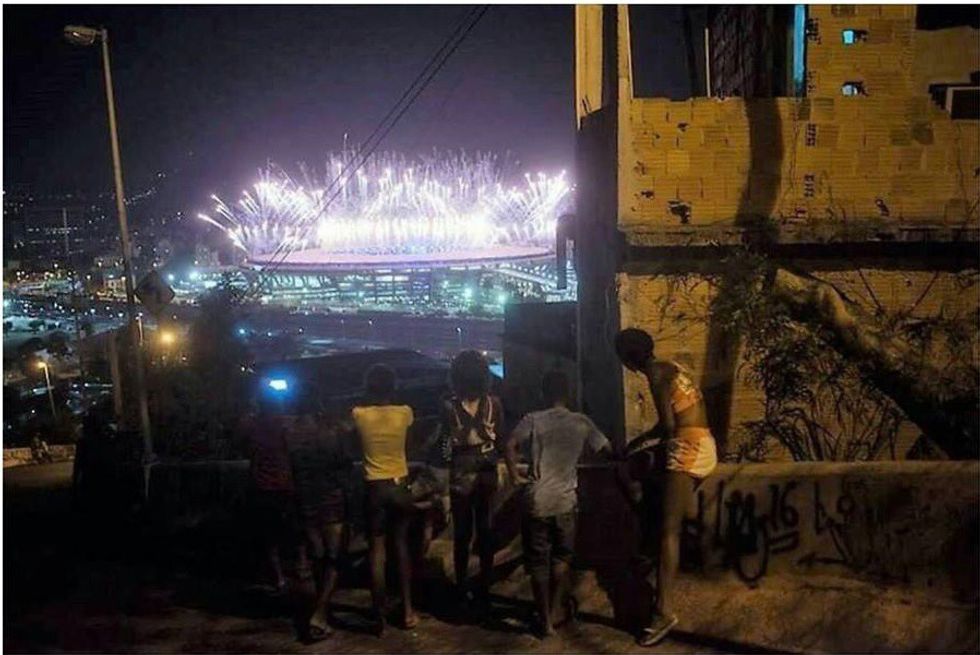By Oak Mitchell and Alona Warren
The Olympics. For some, it signals joy and celebration. For others, it is the harbinger of doom.
In Rio, Christ the Redeemer stands with arms outstretched. He is a welcoming figure, conjuring mental images and feelings of unfailing love and acceptance.
Another image that's been conjuring intense feelings lately is a photo that's been floating around Facebook. It's one of poor children from Rio watching the bright stadium lights of the Olympic ceremony, knowing they could never afford admission to such an event that cost their country millions to host. What's more, many of the local poor, like these kids, had their houses demolished to make way for this venue and its massive parking facilities.
Don't you think they deserve a seat at the table? Maybe a VIP pass to the games so they can meet the athletes they gave up their homes for? I can't help but feel a little nauseous when I watch the games after seeing that picture. When I think of what Jesus would have to say about kicking out the poor to make way for games, I can't help but imagine that the outstretched arms on Christ the Redeemer depict him throwing his hands up in frustration as if to say "really, dude?"These atrocities, like what's happening in Rio, are nothing new. In 2008, the Summer Olympic Games were held in Beijing. China is not exactly known for championing human rights, and after Tibetan riots, things got worse. Reporters from other countries were threatened and restricted from covering the topic at all. As with Rio, many residents were displaced to make room for the venue. Despite this concerning news, the 2022 Winter Olympics will be held yet again in Beijing. Displacements have followed Big Games like the proverbial monkey-on-your-back for some time now, and not just because of the Olympics. The 2014 FIFA World Cup, also held at Rio's Estádio do Maracanã (shown above), similarly cost the country millions in renovations and upset the local public. One could ask: are these sporting event committees held to any standards on this issue? It seems they are content to let potential host countries compete for the prize that is the sporting event without careful regard to how this will benefit the city long-term, or even if it will put many people at a disadvantage. When people sit down to watch the Olympics at home, they don't think about what goes on behind the scenes, or whether or not the motives of the people behind the event are being selfish. All we think of as spectators is that we get to see athletes display their years of hard work and determination. We aren't thinking that someone is being stepped on to entertain us.
Brazil has already considered taking massive loans to cover expenses for the 2016 games. Will they break even from this exposure in the heat of their current recession? It's a gamble. In order to be a host city for Olympic games, the local and federal governments of said region must put up the funds to to support the event. Since being a host for the Olympics carries so much prestige and tourism benefits, the offer is simply too tempting for Brazil to pass up, especially in the wake of Zika and its obvious negative implications to their economy. Brazil wants nothing more than to appear spotless, and is willing to use gentrification and extortion tactics. In short, Brazil gains Olympic prestige and an excuse to bulldoze over those unsightly slums. The only problem is, those "slums" are people's homes.
There have been countless protests from the people of Vila Autódromo, a Favela (village community) in Rio. In spite of the 99 year lease that the residents have in place to protect them from this sort of thing, the government of Rio de Janeiro planned to reduce the size of the village by 83% after being selected to host the Olympic Games in 2009. Rio began to prepare for the FIFA World Cup in 20011 with forced evictions, and just a few months ago in June, there was a violent clash there between police and residents who refused to leave. It's insane to think that this has been going on for several years with little media coverage. About 19,000 families were displaced in Rio alone for the World Cup, and another nearly 300,000 families were evicted or threatened with eviction across Brazil. (Have you heard about it?) Vila Autódromo has been a community of over 600 families for about 50 years. Only about 20 families remained to fight until the end. A lot of the residents left, scattering around Rio in search of affordable apartments or homes soon after it was announced that the Olympics would be held near them, as the government gave them all an ultimatum: get out, or no compensation. We'll kick you out, and leave you with nowhere to go if you put up a fuss. Hundreds of people were still living in the village when demolition began. Imagine being pushed from your home for an event that only lasts two weeks. The home you have had for decades, one that you grandfather built and where you know everyone by name, is being demolished and you have no say in the matter. Maybe it is not in the best neighborhood, but it is the epitome of what a community should be. The faces of your neighbors are as ingrained in your head as the landscape. That is all gone now. It has been destroyed for the entertainment of the masses and to save face for political reasons.
Although the government of Rio may have provided new housing to some of the poorest people displaced by the Olympics, is any of this really fair? Some residents were even told to leave, having no where to go, while these facilities were being constructed. Is the government of Rio going to continue to help these people keep their new homes, or is this just a Band-Aid for the backlash to make the Rio government not look like heartless tyrants? These people are still considered to be in the lower class of Rio and they may not even be able to afford the cost of living over time in these nicer facilities. According to Brazil’s government statistics bureau, about 16 million people live on less than the US equivalent of around $1.30 per person a day. About 5 million of them survive on no income at all. Favelas were originally constructed by the poor and have continued to grow since the 1920's because they could not afford the cost of urban housing. After the Games, Luxury apartments are planned for what was once Villa Autódromo, with each one selling for an estimated price of $700,000. This is nothing short of carefully planned gentrification.
Does the International Olympic Committee consider giving financial help to accommodate victims of Big Sports Displacements? Global Sporting Events have incredible benefits, especially for countries that want to promote themselves, and present a successful image. Brazil needs that now more than ever in light of recent political controversies that, unsurprisingly, mirror our own political landscape in the United States.
The sentiment of bringing pride to Brazil is a noble one, but it is my fear that the priorities of tourists have taken a back seat to the priorities of the people. With these complicated issues in which the country is currently involved, it is time to ask whether or not the Olympics, (and other massive Sporting Events), should reform their policies on the host selection process. These massive events that rake in so much revenue should be called to take responsibility for this damage. According to the International Olympic Committee's official website, about half of their revenue is generated from television broadcasts, and the other half, roughly, from sponsorship. Only about 5% of revenue is from ticket sales, and about 3% comes from other licensing of the Olympic name. According to Business Insider, the Olympics generate about a billion dollars a year in revenue and their headquarters are based in Switzerland: a "tax haven." Upon further exploration of their website, you can see that the venues have already been selected for the next six years with games planned in Pyeongchang, Tokyo and Beijing. With all of this money and foreknowledge at the Olympic Committee's disposal, surely there are alternatives to shattering entire communities.
Though the local governments of Brazil are directly responsible for these displacements, the silence and refusal to acknowledge this problem from the Olympics as a multi-billion dollar entity is deafening. Enticing struggling countries with the lure of prestige without vocally denouncing or attempting to prevent forced evictions is completely unjust. Perhaps there is media silence because we in America are so used to imperialism. After all, what's so bad about forcing the natives out to make room for bigger and better things, considering our own historical predilection to do the same? The Olympic Planning Committee has a responsibility to those children in the picture and to the children around the world that I am sure will be experiencing the same thing in the years to come. The Olympics should stand up to countries like China, and speak out against injustice. They have one of the largest platforms in the world with which to do so.






















